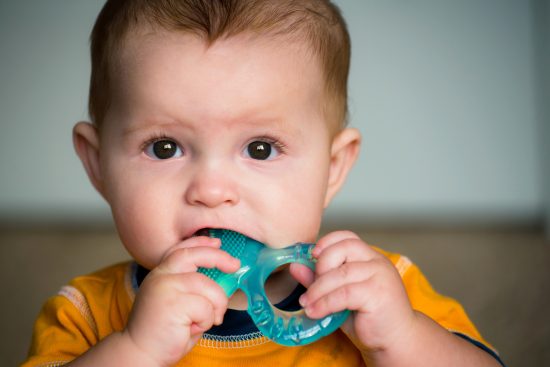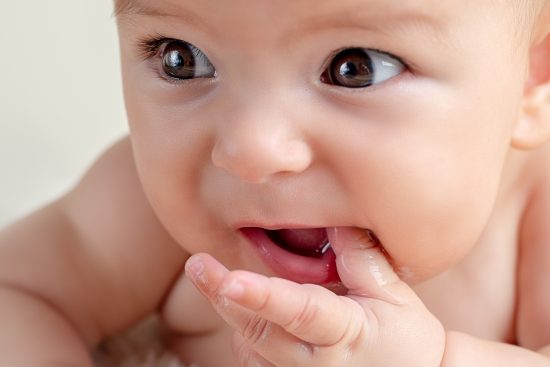This article explores teething toys and other remedies available to help your (currently grumpy) baby through the torment that is teething.
A sure-fire way to know your baby is teething is when they start chewing on anything for some relief. The pressure provides real respite for them, and while their fist can be a good start, you might also want to have some other items to hand.

Teethers can relieve sore, sensitive gums.
“Pushing gums down on a teether feels good for them because it provides counter-pressure to a rising tooth and massages the gums. “
Plus it’s a distraction for them and you know they’re gnawing on something safe, rather than your phone charger.
Teething toys come in many different shapes and sizes. Some are good for young babies to grip easily, such as a teething ring.
Others are great for those molars, as they get right to the back of the mouth. Here is the lowdown so you can try something that suits your little one.
Often these teethers come in animal or comedy ‘real food’ shapes, with plenty of lumps, bumps, loops and ridges to grip on and get those gums into. These appeal to parents as they are natural and often made with food grade or natural pigments. But they’re wipe-clean only so not suitable for the dishwasher or steriliser.
These teethers come in just as many varieties as the rubber teethers. The main difference is that silicone is man-made so these teethers can be put in the dishwasher or fridge. Look out for food grade or medical grade silicone.

These are the classic teethers. They can be solid or filled with sterilised water.
Look out for those made free from BPA, PVC and phthalates, which might be harmful.
As there are many different plastics, check the packaging to find out whether you can cool or heat the one you buy (for soothing or cleaning).
These are a good alternative for those parents keen to cut down on plastic consumption. Usually wipe clean, make sure you get them from a reputable source so they don’t splinter.
These are novel for younger babies who just won’t get those little hands out of their mouths. Made of fabric with plastic or silicone chews, these are available in a variety of colours and textures.
Often your baby’s toys have a corner or hanging piece that is intended for teething and tempts them to chew. You will probably accumulate these in your collection without even realising their purpose. Oh that’s what that is for.
This can also be useful – even before those pegs need their first scrub. Just ensure the bristles aren’t splaying or coming loose in the mouth and don’t leave them unattended.
Surprising as it sounds, it could do just the trick. Use one of your baby’s weaning spoons as these are designed for little gums and you can rest assured they’re safe.

While you’re in the kitchen raw carrot sticks, cucumber, breadsticks or bread crusts for babies over six months are all worth trying.
Just make sure you’re on watch to avoid them choking on the chunkier items.
“Try to avoid rusks. This is because nearly all brands contain some sugar and that can cause tooth decay, even if your child only has a few small teeth.”
Massaging around their gums for one to two minutes using a clean finger soothes their pain and distracts them. It can also help you figure out what’s going on in there.

Chilled items can help soothe those fiery gums. Why not try a cold flannel – tie a knot in one end, wet it then pop it in the fridge. Hey presto, an instant chilly comforter.
Or try cold foods such as a puree or yogurt straight from the fridge.
Putting a teether toy in the fridge can also be a brrrrrrrilliant idea.
A couple of warnings:
Of course, there are remedies to reach for if those teethers have been put through their paces (and shoved in their faces) and your baby needs more help.
Teething gel
If your baby is over four months old, you can rub sugar-free teething gel on their gums. They often include a mild local anaesthetic to numb pain, and antiseptic to prevent infection. Talk to your GP or pharmacist before you use it on a younger baby.
There has been advice not to use Bonjela ulcer treatment, although teething gel is deemed safe. So make sure you know the difference between the teething gel and ulcer treatment.
Homeopathic teething tablets, gels or powders
The use of homeopathic products is not recommended
Those available online should not be used because of a risk of side effects and they are likely to be unlicensed in the UK. A list of homeopathic products that are licensed by the Medicines and Healthcare products Regulatory Agency can be found here.
The use of homeopathic products is not recommended purely because there is no good evidence to support their effectiveness. If you do decide to try a treatment (purchased in a reputable shop in the UK), follow the manufacturer’s dosage instructions.
Painkillers
When teething is causing your baby pain or a mild raised temperature (less than 38°C), you could try a sugar-free painkiller for babies and young children. These contain a small dose of paracetamol or ibuprofen. Children under 16 should not have aspirin.
Good old cuddles
Teething is new to your baby and might make them super grumpy. But it can also be pretty upsetting for you, because it’s probably the first time you’ve seen them in pain. As well as the solutions above, comfort can help too.
In fact cuddle therapy is a proven help in soothing teething pain. So give them that extra dose of cuddles, and sing and talk to them in a soothing way. That way they’ll feel assured you’re right there with them to help them through the pain.
Our support line offers practical and emotional support with feeding your baby and general enquiries for parents, members and volunteers: 0300 330 0700.
You might find attending one our NCT’s Early Days groups helpful as they give you the opportunity to explore different approaches to important parenting issues with a qualified group leader and other new parents in your area.
You can read more about teething in our range of articles.